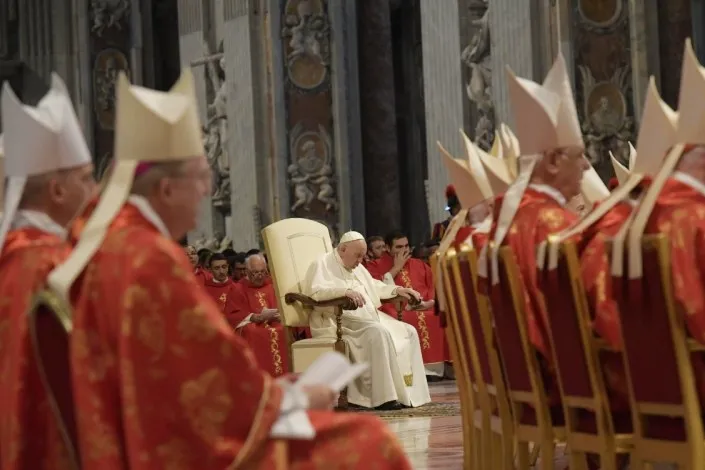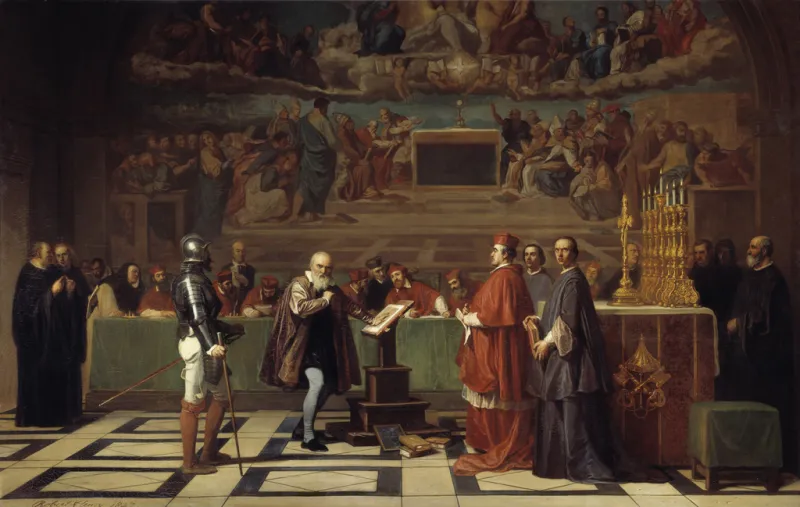
On Pentecost, Pope Francis explained how to recognize the Holy Spirit’s voice
 Pope Francis sat at the front of the congregation in St. Peter’s Basilica on the Solemnity of Pentecost on June 5, 2022. / Vatican Media
Pope Francis sat at the front of the congregation in St. Peter’s Basilica on the Solemnity of Pentecost on June 5, 2022. / Vatican Media
Vatican City, Jun 5, 2022 / 04:30 am (CNA).
On the Solemnity of Pentecost, Pope Francis offered advice on how to distinguish the voice of the Holy Spirit from “the voice of the spirit of evil.”
Speaking from a wheelchair in front of the main altar of St. Peter’s Basilica, the pope provided several examples of how to recognize the inspiration of the Holy Spirit, who “at every crossroads in our lives suggests to us the best path to follow.”
“The Holy Spirit will never tell you that on your journey everything is going just fine. … No, he corrects you; he makes you weep for your sins; he pushes you to change, to fight against your lies and deceptions, even when that calls for hard work, interior struggle and sacrifice,” Pope Francis said in his homily on June 5.
“Whereas the evil spirit, on the contrary, pushes you to always do what you think and you find pleasing. He makes you think that you have the right to use your freedom any way you want. Then, once you are left feeling empty inside – it is bad, this feeling of emptiness inside, many of us have felt it – and when you are left feeling empty inside, he blames you, becomes the accuser, and throws you down, destroys you.”
“The Holy Spirit, correcting you along the way, never leaves you lying on the ground, never. He takes you by the hand, comforts you and constantly encourages you,” he added.
The pope, who has suffered from knee pain in recent months, did not preside over the Pentecost Mass. He sat in a white chair in front of the congregation to the right of the altar. Francis was assisted to the front of the altar in a wheelchair to offer the homily.
Cardinal Giovanni Battista Re, the 88-year-old dean of the College of Cardinals, served as the main celebrant for the Mass, as he did on Easter Vigil earlier this year.
In his homily, Pope Francis underlined that feelings of “bitterness, pessimism and negativity” never come from the Holy Spirit, but come from evil, which “stokes impatience and self-pity … complaints and criticism, the tendency to blame others for all our problems.”
“The Holy Spirit on the other hand urges us never to lose heart and always to start over again. … Get up! How? By jumping right in, without waiting for someone else. And by spreading hope and joy, not complaints; never envying others, never – envy is the door through which the evil spirit enters — but the Holy Spirit leads you to rejoice in the successes of others,” he said.
The pope added that the Holy Spirit is “practical” and “wants us to concentrate on the here and now, because the time and place in which we find ourselves are themselves grace-filled.”
“The spirit of evil, however, would pull us away from the here and now, and put us somewhere else. Often he anchors us to the past: to our regrets, our nostalgia, our disappointments. Or else he points us to the future, fueling our fears, illusions and false hopes. But not the Holy Spirit. The Spirit leads us to love, here and now,” he said.
The Solemnity of Pentecost, which is celebrated 50 days after Easter, marks the descent of the Holy Spirit. Thousands were gathered inside of St. Peter’s Basilica for the Mass.
The twelve fruits of the Holy Spirit are charity, joy, peace, patience, kindness, goodness, generosity, gentleness, faithfulness, modesty, self-control, and chastity.
Pope Francis said that the Holy Spirit “rejuvenates the Church” and teaches the Church “to be an open house without walls of division.”
“Brothers and sisters, let us sit at the school of the Holy Spirit, so that he can teach us all things. Let us invoke him each day, so that he can remind us to make God’s gaze upon us our starting point, to make decisions by listening to his voice, and to journey together as Church, docile to him and open to the world,” he said.





